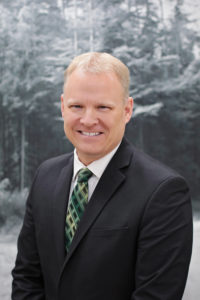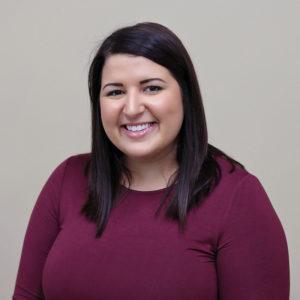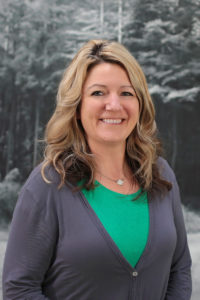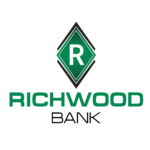Back to Business – Millersburg
Main Street Millersburg
Farmhouse Frocks, a mother-daughter boutique and clothing line in Historic Downtown Millersburg, recently added a new product to their handmade, stylish clothing line — masks. So far, they have sold thousands of these, sending 20,000 masks to a New York City bank and being recognized on national news.
This is just one Main Street Millersburg business that managed to flourish during the shutdown. Other Millersburg businesses adapted their business practices to offer care packages, family meals and positive outlooks. With these practices and a country setting, Millersburg businesses have survived and thrived.
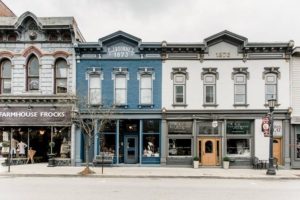
Local Millersburg restaurants, such as Bags Sports Pub, have been offering curbside pickup and family meal packs. According to Main Street Millersburg director Judy Lamp, this has been a huge success and revealed an unfulfilled need.
“There are a lot of people wanting family meals from regular restaurants, not just Taco Bell or Pizza Hut,” she says. “They want good meals.”
Lamp also says that offering alcohol for carryout and delivery has been vital to the success and survival of some businesses. For example, Sunny Slope Winery offered wine bottles paired with local deli meats and cheese, lunch trays and wine slushies. Nine employees were hired to meet this demand, and Lamp hopes restaurants can continue to provide carry out alcohol.
With extra free time, many local businesses built and developed their online presences through working on websites or posting sales and news.
They have also used social media to support each other; Sunny Slope Winery recently encouraged people to visit Millersburg Brewing Company’s reopening on Facebook, and the brewing company in turn encouraged customers to visit Sunny Slope. This support and encouragement among the local businesses.
In addition to Sunny Slope Winery, Farmhouse Frocks had to recruit and hire more Amish families to sew masks. A new Millersburg business, Fallen Timbers, opened during quarantine and has been busy reworking floors and walls.
In Walnut Creek, Coblentz Chocolate Company created meal packages and delivered them to underprivileged local families, and Lamp herself has been delivering meal deals to hospital workers after their long shifts have finished.
Other merchants have created event packages, such as Mother’s Day and birthdays.
“That is something people have really grabbed a hold of, if they wanna send somebody a little gift,” she says. “I’ve just been thinking to myself ‘That is one less order that Amazon got.’”
As businesses reopened, Lamp says business owners implemented every order given: installing plexiglass, removing barstools, distancing tables, wearing masks, limiting people and wiping doorknobs. This compliance surprised Lamp, and she says business owners moved past every hiccup or breakdown.
“A lot of the things that (the businesses) can’t do is the things that made them special,” she says. “McKelvey’s is known to be packed, it’s loud and a Homes County favorite, and they’re not gonna be allowed to have that many people in there.”
An advantage of Millersburg businesses is its country setting. As one of the largest tourist destinations in Ohio, they were hit hard by the shutdown. But restaurants like McKelvey’s have more outdoor seating available than a city setting.
On the weekend of May 16, people were milling around downtown, sitting on propped chairs and tables outside, eating their lunches or ice cream cones in the sunny weather.
“Friday was packed,” Lamp says. “Being where we’re at — not in the city and out in the country — I think that’s gonna help with our comeback.”
Lamp has heard people say personal customer service has become vital, but she says Holmes County businesses have always offered it.
“Keep doing what you’ve always done, and what you’re good at,” she says. “With my merchants, that is that one-on-one, making (customers) feel great from the time they walk in the door.”
To recover, Lamp says she will return to how she built Historic Millersburg when she started as director eight years ago — focus on gaining local support for small businesses first, then tourism. She suggests that business owners remain positive.
“I once made a statement to someone that I’m from Holmes County,” she says. “We can make anything.”
Back to Business – Wooster
Main Street Wooster
Flamingo Jack’s food truck hit the streets during quarantine. This Main Street Wooster business sold its unique comfort food in the parking lot of other brick-and-mortar Wooster businesses. The pink and blue truck has served customers outside Lincoln Way Vineyards, Miss Amy’s Cupcakes and Spoon Deli, attracting customers to these businesses and gaining more customers in turn.
This cross-promoting is one example of community in Main Street Wooster. During shutdown, Main Street supported businesses in many ways and will explore even more with its grant funding. As stores reopen, Main Street businesses are taking precautions and relying on Wooster’s small business community.
In early March, Main Street Wooster director Shannon Waller worked with the Convention Visitors Bureau and Chamber of Commerce to create a comprehensive website. It lists open businesses, new hours, and available services and products. It is one place for people to see their options, and administrators continue to update the website.
“That was the biggest success from the get-go to help people continue their revenue streams,” Waller says. “That was helpful in harnessing that community spirit that was already there.”
It also created consistency between the businesses’ online presences.
Along with restaurants and bars collaborating like Flamingo Jack’s, retailers coordinated their hours to encourage customers to visit each other.
The Main Street Wooster team encouraged this cooperative spirit in different ways as requirements and circumstances changed. With only two people in the office, Waller and project coordinator John Benko-Scruggs initially went to visit each business themselves.
“We put on some walking shoes and just pounded the pavement and visited everyone within our area.” Waller says.
When they couldn’t go outside anymore, Waller and Benko-Scruggs contacted the businesses by phone, and left encouraging messages to shuttered businesses.
“If they were on the cusp of closing, we wanted them to let us know before they made an irrevocable decision,” Waller explains. “Because we knew that there were people in the community who would try to get them through it.”
When businesses faced challenges, Waller says Main Street Wooster acted as a clearinghouse to explore any loans available; the chamber of commerce and economic development council created a webinar series about funding opportunities.
Recently, Main Street Wooster wrote encouraging notes to each of the businesses on some old Main Street Wooster postcards Waller found.
“We got some nice responses from people who were just happy for the mood lift they got when they had to stay at home,” she says.
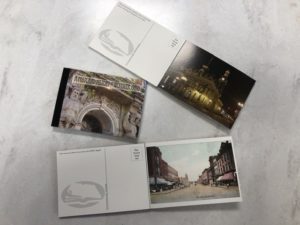
The pair visited each business again to welcome the owners back as they reopened. Waller asked about any specials or hours they would want Main Street Wooster to share, and they discussed what the businesses were hoping for as they reopened.
The businesses worked hard to implement all safety procedures, with employees wearing masks, providing hand sanitizer and early hours for people at risk. Some business owners encourage customers to wear masks while others require it.
“They have family members who are vulnerable or employees with family members who are vulnerable,” Waller says. “They’ve gotten a little bit of push back here and there, but nothing that would intimidate anybody into changing that level of safety.”
Waller explored the possibility of expanding restaurant space with the chamber of commerce, local attorney and restaurateurs. They are hoping to get a designated outdoor refreshment area (DORA) and expand dining areas into closed streets and parking spots.
In May, Main Street Wooster received the Main Street Grills Fund. The first part of the spending plan is to create training videos with the local hospital and health department. They also want to invite business owners to approach health professionals and adapt their business practices.
They are also exploring car-related activities for people to have group experiences while social distancing. They are organizing a cruise-in through decorated downtown and residential areas that would award prizes to best business decorations, residential decorations and car decorations. The procession would end at a pop-up movie theater and local food trucks, and admission would be a $15 receipt from a downtown merchant.
In addition to the training certification, Waller says that all the businesses have at least a time frame and plan for reopening.
“You don’t get into business without being strong, creative and able to solve problems,” she says. “We’ll get through this.”
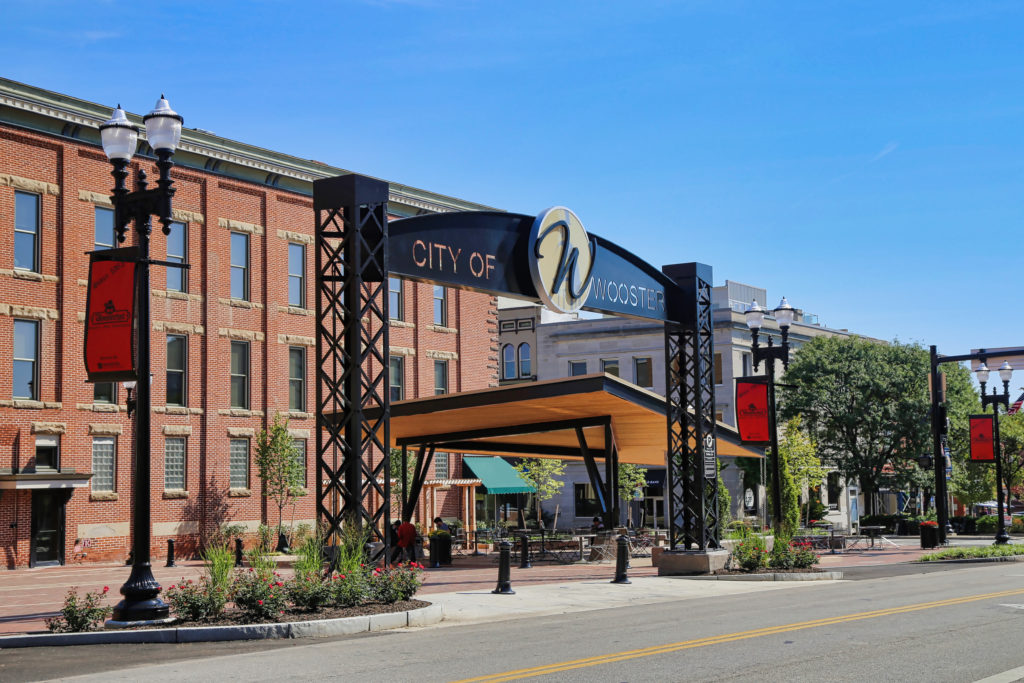
Back to Business – Medina
Main Street Medina
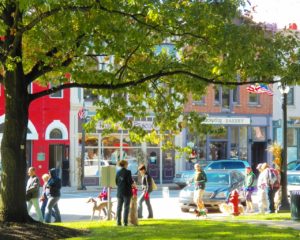
On April 18, The Raspberry and the Rose gift shop in Main Street Medina reposted All Fired Up’s Facebook Live sale. Along with other small Medina businesses, these small businesses have supported and promoted each other on social media during quarantine.
This is one way local Medina businesses adapted their practices during COVID-19. The businesses generated revenue and support through social media and strengthened the small business community together. As stores reopen, Main Street Medina will post Facebook Live videos of downtown businesses and offer Main Street Medina Bucks to continue building this community.
“Social media is really the best, easiest and most efficient way for them to reach their customers,” says Matt Wiederhold, executive director of Main Street Medina. “It’s also been the best way for us as a Main Street program to directly promote our members.”
Wiederhold says that local retail stores — The Raspberry and the Rose, All Fired Up! Medina, JK Gift Shop and the Gardener’s Cottage — have not only been holding Facebook live sales but also promoting the work of other local businesses.
“We have a lot of women’s boutiques in town, so they’re all in competition with each other,” he says. “It’s been cool to see them cross-promoting each other on Facebook. In an odd way, the isolation has built a community.”
On Fridays starting June 5th, Main Street Medina will be having Facebook Live tours to spotlight local businesses. The team will walk through the district and stop at restaurants and shops for brief tours, meet-and-greets and advertise any sales.
“It’s a way for our member businesses to connect with the people that like our Facebook page,” Wiederhold says. “Rather than just reaching out to their audience, they’ll be reaching out to our audience.”
Beyond social media, Wiederhold says that each of the businesses has adapted to COVID-19 circumstances differently.
“Some businesses are requiring masks, some are putting up barriers at their check out counters, some are limiting the number of people allowed in the store,” he says. “People are picking and choosing from the recommendations of the governor what works for them.”
As a Main Street organization, Wiederhold and his team have been checking in with retailers and business owners frequently to ask how they’ve been doing and encouraging them to stay positive.
“We’ve been reminding people we’ve gone through things like this before,” he says. “This community loves our local stores, they love our square, and we know that when things are somewhat back to a new normal, people will come out, shop and support our businesses.”
People have been hangin eating downtown at three picnic tables the city has added to the square. Main Street Medina also encourages customers to shop downtown with Main Street Medina bucks. These $5 cash vouchers are redeemable at any business listed on the back.
On the opening day of the Farmer’s Market and each week after, ten Main Street Medina Bucks will be given to winners of drawings or passed out at special events.
“It’s a way to get customers into our member businesses and give them direct benefits,” Wiederhold says. “If someone likes a Facebook post, they can win Main Street bucks.”
Wiederhold says that the next two months will be critical to determine the success of small, local businesses. They are now waiting to see how the reopening process will go and whether consumers will be ready to return to businesses or prefer to stay away.
“Know that customers are gonna be edgy and anxious,” he advises. “Be kind and calm, put on a smile, and know that a better tomorrow is coming.”
Change and Tradition: Downtown Main Streets in Ohio Web Discussion
Thursday, June 11th – 1:00 pm – 2:00 pm
Wellington has a rich tradition of late 19th Century commercial buildings that have been preserved in the downtown area. This look at the buildings of downtown will focus on the styles of the original buildings, both in current photos and historic photos, and the changes that have been made to the streetscapes over the years. To put the town in context, we will look at the development of downtowns in various places throughout Ohio, including Hudson, Medina, Norwalk, and Warren.
Speaker
Christie Borkan is an architectural historian who grew up in Wellington, living on North Mill Street and later on South Main Street. She earned a BA in Art History from Hiram College, and an MA from the Winterthur Program in Early American Culture, University of Delaware. She has worked in the Spirit of ’76 Museum, the Cleveland Museum of Art, Hale Farm & Village, and the Western Reserve Historical Society. She has also taught courses in American Decorative Arts and American Architecture for over 30 years at Hiram College and Cleveland State University.

Why Signage is Important & Why Business Owners Aren’t Excited About Signs, But Should Be! Web Discussion
Thursday, June 11th – 11:00 am – 12:00 pm
Meggan and Jason with Innovative Marketing Products will discuss sign materials and cost as well as designs, colors, fonts and what to put on a sign.
We would love to leave time to answer questions. Jason will handle all questions related to specs and fabrication as he can answer any question ( we mean any) that you may have.
Innovative is a small sign shop located in Wellington, OH. We are entering our fourth year as business partners, but Jason has over 20 years experience with signage and industrial arts. We specialize in designing and fabricating custom signage. We take a lot into consideration before we have a solid foundation for a sign idea. We do one to two site surveys of a business to help us develop a plan for a sign. We will then design and create digital images to share with a business owner before we begin production.
In many cases, we handle all the sign licenses with the city and finalize details with the building departments. We also do sign refurbishment; providing some TLC to older signs or a logo change. We also offer banners and car graphics. When we first got started we thought we would go into personalized products as well as signs, but we are sticking to signs, banners and car graphics, so you may see a name change! The best place to find us is on Facebook at Innovative Marketing Products, llc.

Medina: 60 Years of Targeted Historic Preservation Web Discussion
Wednesday, June 10th – 1:00 pm – 2:00 pm
Founded in 1818, and suffering a major fire in the 1840s, and again in the early 1870s, Medina, Ohio has risen like a phoenix several times over its storied history. Largely rebuilt between 1871-1881, our community features a cohesive and comprehensive collection of mid-to-late 19th Century brick commercial buildings.
In the mid-1940s, Medina, was chosen as a quintessential, Midwestern small town in America, and was the focus of an RKO/Pathe Pictures 20-minute short film called Hometown USA. However, by the 1960s, the historic buildings surrounding the town square has been modernized, bastardized, and generally ignored.
Join Matt Wiederhold from Main Street Medina as he shares how 60 years of targeted historic preservation and private investment became the stepping stones to economic vitality in Medina, Ohio, and how important preservation and authentic placemaking is to creating a vibrant community.

Banker Panel Online: Covid-19 Assistance Questions Answered
Wednesday, June 3rd – 1:00 pm – 2:00 pm
Answers to your hard questions from our panelists at Richwood Bank:
- PPP forgiveness
- SBA – what they can do for small business
- How to ask for help
- Banking on the other side of Covid
- Small Business, custom solutions
- Communication – More is better
- How to use marketing tactics – different ways people are shopping
Speakers
Chad Hoffman
President/CEO
choffman@richwoodbank.com
Emily Davis-McElroy
Union County Regional Vice President
edavis@richwoodbank.com
Heather Wirtz
Chief Experience Office
hwirtz@richwoodbank.com
Richwood Bank since 1867
www.RichwoodBank.com

Ohio’s Historic Architectural Styles Webinar
Thursday, May 28th – 2:00 pm – 3:00 pm
Celebrate National Historic Preservation Month by discovering the richness and diversity of Ohio’s architecture. The story of Ohio, from early settlement, through industrial expansion, to modern times, is reflected in its landmark buildings, urban centers, small towns, and the work of specific architects and builders. This free webinar will introduce broad architectural trends and characteristics of specific styles examined within the context of 19th and 20th century Ohio.
This webinar is provided by The Ohio Arts Council.

Reopening Your Business: Practical Considerations Webinar
Wednesday, May 13th – 1:00 pm – 2:00 pm
Join the legal team from Vorys Law Firm as they share practical consideration for re-opening your business following Covid-19 closures.
We will have four experts providing a variety of information, which meet a variety of needs in our communities:
- Karen Cincione: Government relations and state stay home orders
- Jolie Havens: Health care
- Bob Harris: Labor and employment
- Webb Vorys: Contracts, commercial and state stay home orders
This webinar is sponsored by a grant from The Nord Family Foundation.
An Introduction to the Secretary of the Interior’s Standards for Rehabilitation Webinar
Wednesday, May 20th – 11:00 am – 12:30 pm
The Secretary of the Interior’s Standards for Rehabilitation consist of a set of 10 common-sense guidelines that we use to guide proper rehabilitation techniques and processes. But how do you judge when a building element can be repaired, versus having to be replaced? How do you handle later alterations to a building? What if your building is missing historic features? Nathan Bevil from the State Historic Preservation Office will be joining us to shed light on how the Standards help preservation professionals guide their decision-making process, insuring a historic building can function in a modern environment while maintaining its historic integrity.
Understanding & Enacting a Designated Outdoor Refreshment Area (DORA) Web Discussion
Thursday, May 7th – 1:00 pm – 2:00 pm
Join us for a discussion about the benefits of your city enacting a DORA with representatives from downtown programs, city council, and restaurants to help determine if this is an appropriate solution to supporting your businesses in this time of social distancing.




